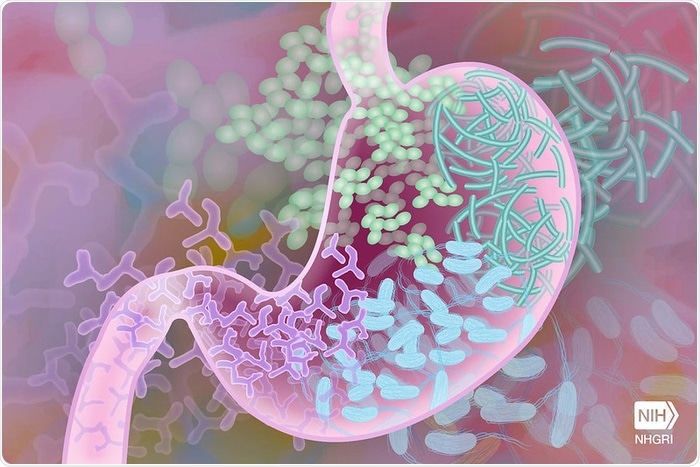A new study has found that fasting before and during exposure to the bacteria Salmonella enterica safeguards mice from developing a fully grown infection, which is partially because of variations in the gut microbiomes of the animals.

Beneficial gut bacteria. Image Credit: Darryl Leja, National Human Genome Research Institute, National Institutes of Health, NIH Image Gallery, Flickr.
The new study by Bruce Vallance and his team from the University of British Columbia, Canada, was published in PLOS Pathogens.
Upon developing an infection, people or animals usually experience loss of appetite. But it is still not clear whether fasting safeguards a host from infection or increases their vulnerability.
As part of the new study, the researchers made mice fast for 48 hours before and during oral infection with the bacteria Salmonella enterica serovar Typhimurium, a common vector that causes foodborne illness in people.
Fasting reduced the signs of bacterial infection in mice that were fed, which included an almost 100% removal of all intestinal tissue damage and inflammation. Re-feeding of the fasted animals for a day after their fast led to a drastic increase in Salmonella numbers and invasion into the intestinal walls, but the related inflammation was still higher than normal.
The findings were not the same when mice were intravenously exposed to Salmonella rather than orally. Moreover, the investigation of microbiomes of mice exhibited major changes related to fasting and protection against infection.
Also, fasting could not fully safeguard germ-free mice—which were reared to lack a normal microbiome—from Salmonella. This indicates that some of the protection was because of the effect of fasting on the microbiome. Experiments performed with the Campylobacter jejuni bacteria verified that fasting’s effect was not restricted to Salmonella, with analogous results observed.
These data suggest that therapeutic fasting or calorie restriction has the potential to beneficially modulate infectious and potentially non-infectious gastrointestinal diseases. Our research highlights the important role that food plays in regulating interactions between the host, enteric pathogens and the gut microbiome.”
Study Researchers, University of British Columbia
“When food is limited, the microbiome appears to sequester the nutrients that remain, preventing pathogens from acquiring the energy they need to infect the host. While more research is needed, fasting or otherwise adjusting food intake could be exploited therapeutically to modulate infectious diseases in the future,” the researchers concluded.
Source:
Journal reference:
Graef, F. A., et al. (2021) Fasting increases microbiome-based colonization resistance and reduces host inflammatory responses during an enteric bacterial infection. PLOS Pathogens. doi.org/10.1371/journal.ppat.1009719.